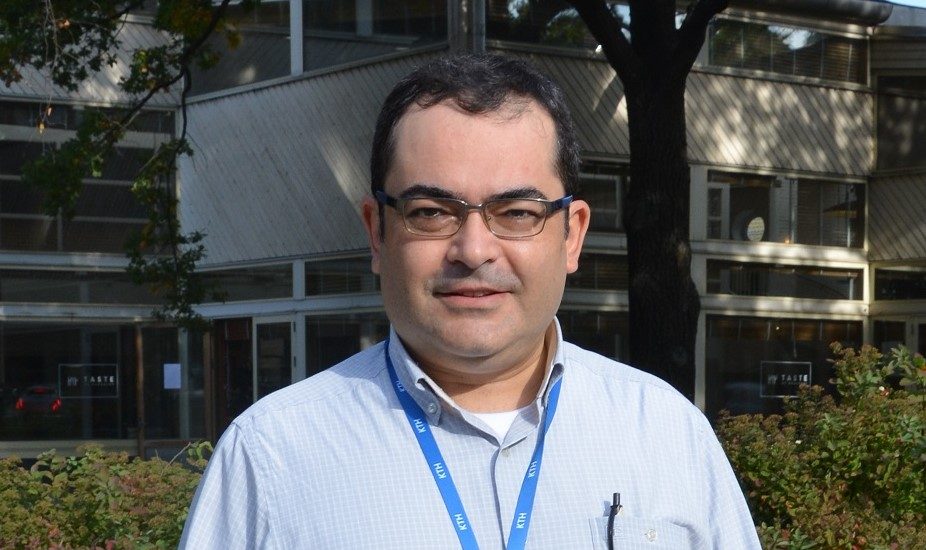
All the way from Canada – meet Digital Futures Scholar in residence, Baris Fidan!
Baris Fidan is a Professor at the University of Waterloo (UW), Canada, in the Department of Mechanical and Mechatronics Engineering Department, with joint appointments at the Departments of Systems Design Engineering and Electrical and Computer Engineering. He received his PhD at the University of Southern California and worked at the NICTA and the Australian National University, Canberra, Australia, for five years before joining the UW in 2010. Fidan is a Digital Futures Scholar in residence from September 2023 to June 2024.
He has been PI/co-PI of research projects and programs focusing on distributed motion planning and coordination of mobile robot and autonomous vehicle networks, adaptive and learning-based motion planning and manoeuvre control for collaborative driving and intelligent transportation, distributed parameter identification and adaptive control of intelligent vehicle systems and mobile robotic platforms, localization and mapping via autonomous vehicle networks, UAV navigation and stability control, filtering and control design for biomedical and human assistive robotic applications.
Hi Baris, you came to Stockholm as a Digital Futures Scholar in residence – all the way from Canada. How did you find out about this opportunity?
– I have known about the great systems, controls and robotics research at KTH Stockholm for a long time. Several researchers I worked with at the Australian National University and the University of Waterloo did research at KTH Stockholm as postdoctoral fellows or visiting researchers while we collaborated with them. Hence, indirectly, I had research collaborations or communications with colleagues from KTH Stockholm before. I first heard about Digital Futures from these colleagues and then learned more from the Digital Futures web pages.
Your research expertise is in Nonlinear and Adaptive Control and Estimation, Multiagent and Cooperative Systems and Sensor Networks, with particular applications in Intelligent Vehicle and Mechatronic Systems. Why do you find all this so fascinating?
– The area of Nonlinear and Adaptive Control Systems, including Adaptive Filtering and Estimator Design, has a lot of attractive challenges. Exploring the solutions to challenging mathematical problems in these areas is quite fun. Seeing different real-life applications of such mathematical design and analysis is interesting and fun. Intelligent vehicles and mechatronic systems form such an interesting real-life application area, where it is great to see the use of mathematical system designs and algorithms in advancing intelligent systems more and more to make our day-to-day lives easier.
What did you do so far during your stay at Digital Futures?
– This stay has been a great opportunity for me to interact with many researchers – professors, postdoctoral fellows, PhD students – affiliated with Digital Futures, who are doing great research studies within my research interests. I plan to continue these interactions as long as possible towards some collaborative research results. So far, I have attended several great workshops, meetings and events organized by Digital Futures, including Digitalize in Stockholm 2023 and Digital Futures Faculty Workshop. These events helped me gain insights into various aspects of my research and academic work. I am currently continuing the collaborative research work initiated with the Digital Futures researchers.
You have also given a short Online Parameter Identification and Adaptive Control course – tell us a bit about this.
– The short course was a condensed, quick, but comprehensive coverage of Online Parameter Identification and Adaptive Control. It aimed to provide a basic ground for the design and analysis of online parameter identification and adaptive control of dynamic systems whose parameters are unknown or changing with time in an unknown manner. Despite the short notice, we had a decent audience interested in the topic. We plan to have some application projects based on what was covered in the short course during my final stay in June 2024.
Finally, tell us a little about yourself. What have you done in Stockholm so far? Any place you would like to visit while in Sweden?
– I am a happy father to two, and as a family, we like travelling and discovering new places. I do not have professional-level hobbies, but I like going on jogs, hiking, sightseeing and solving puzzles. My stay in Stockholm has been really nice so far. I had a chance to go sightseeing in the close vicinity of Stockholm on the weekends. Some of the places I visited are the Vasa Museum, Skansen, Swedish History Museum, Stockholm City Museum and the Nobel Prize Museum noting that I particularly enjoyed Skansen and Vasa as unique places. There are a couple of other places I would like to visit in and around Stockholm during my final stay in June. Then, when the weather is more convenient, I also hope to have a few multi-city train trips within Sweden.
You will have your final stay at Digital Futures in June 2024 – what will you do next?
– In my June stay, I am mainly planning to get the initiated research collaborations better structured, keep working on these topics, have further interactions with the Digital Futures researchers I am communicating with now, and plan the next steps of the research collaborations. I will also have some follow ups of the Short Course on Parameter Identification and Adaptive Control in the form of some application projects and a follow up talk in the June stay. After completing my visit, I plan to continue the research collaborations with Digital Futures and KTH in Stockholm further, while continuing my teaching, research, and projects at the University of Waterloo.


